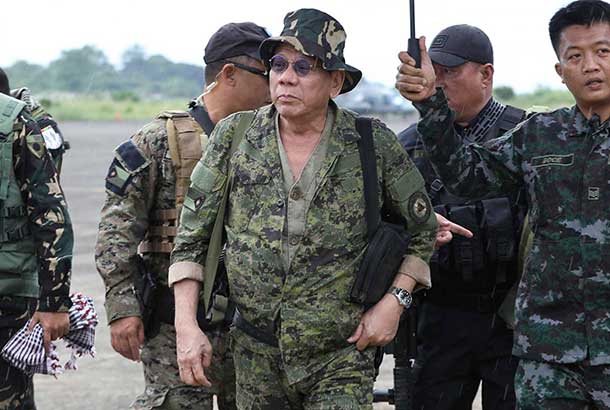Filipinos must fight retreat of democracy, rights under Duterte, says CHR chief
May 31, 2018 | 9:55pm

In this July 20 photo, President Rodrigo Duterte, center, clad in a camouflage uniform prepares to board a helicopter from an undisclosed place to visit troops in Marawi City.
Presidential Photographers Division / Ace Morandante, file
MANILA, Philippines — Filipinos should oppose the retreat of democracy and human rights in the Philippines under President Rodrigo Duterte, the chairman of the Commission on Human Rights said.
Writing in Time magazine, CHR chairperson Chito Gascon said that Filipinos must affirm a “politics of civility and inclusion” and employ non-violent strategies in our parliaments, courts, online and on the streets.
“Let us be emboldened by an unrelenting will to stand up for justice, and an undying faith in humanity’s capacity for good. If we do not struggle, we will not overcome. We must push back,” Gascon wrote in the American magazine.
He stressed that the Philippines, and the world in general, needs more democracy and must uphold human rights, describing this as the most important battle of today.
Gascon said that democracy and human rights are important in human development that would create conditions for people to reach their full potentials.
“As long as persons in any part of the world remain deprived of their fundamental rights and freedom, we are all diminished,” Gascon said.
Gascon warned that failure to protect and respect human rights and other fundamental freedoms would show that the universal human rights project would indeed mean nothing.
The Palace has rejected concerns on human rights in the Philippines, saying the government has not faltered in its commitment to uphold them. The government has also said that human rights has been "politicized and weaponized" to undermine the Duterte presidency.
Duterte has said that he is not answerable to human rights watchdogs since he was not elected into office by them but by the millions who support the widely popular president.
Under Duterte, the Philippine government has been criticized both locally and internationally for its bloody war on drugs, which has been blamed for the deaths of more than 4,000 of mostly urban poor Filipinos in anti-drug operations. The government maintains that those who died had violently resisted arrest.
Thousands of other deaths have been classified as homicides or have been attributed to vigilantes and to drug syndicates.
To date, according to Gascon, no person has been held accountable for the abuse of authority or rights violations in the high number of deaths attending the drug war.
“Impunity—a reality in my country even before Duterte—has reached unprecedented levels,” he said.
'False, dystopian dichotomy'
Gascon lamented that the promise of human rights norms and domestic and international protection mechanisms had been broken around the world.
Gascon said that the appeal of the political "strongman" in countries across the world could be due to their ability to offer a safer, more secure and more stable society in exchange for diminished freedoms.
“This false and even dystopian dichotomy has regained some currency by feeding upon growing public frustration with governments’ inability to make democracy work for all,” Gascon said.
“Over time they then dismantle—often with popular consent—whatever constitutional guarantees there might be to rights and freedoms, thereby diminishing democratic accountability,” he added.
In recent years, populist leaders have risen in many parts of the world with the promise of security amid the societal and economic upheavals many countries are facing.
In the Philippines, Duterte positioned himself as an outsider from Davao City ready to take on the country’s traditional elite.
BrandSpace Articles
<
>
- Latest
- Trending
Trending
Latest
Trending
Latest
Recommended


























